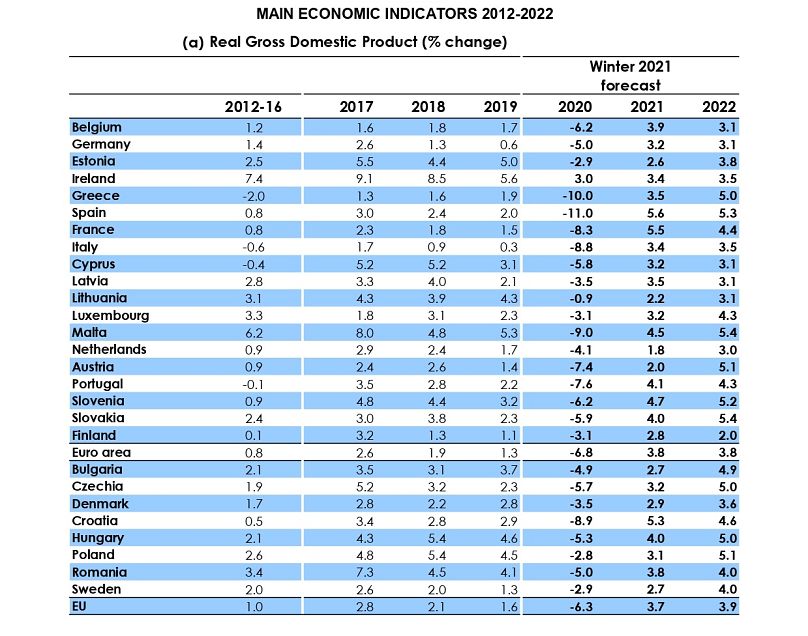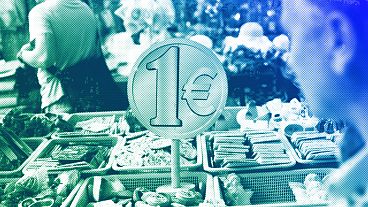Commissioner Paolo Gentiloni warned that uncertainty remains high but that the vaccine roll-out and the EU's recovery fund could help accelerate growth in 2021.
The vaccine roll-out and the easing of coronavirus restrictions will allow the EU's economy to recover faster than initially expected. Some countries will regain their losses already in 2021, while others will have to wait until 2022.
This is the latest economic forecast from the European Commission, which projects that the eurozone economy will grow by 3.8% in both 2021 and 2022 after falling an unprecedented 6.8% in 2020.
The EU economy as a whole will see growth of 3.7% in 2021 and 3.9% in 2022 after a 6.3% drop last year.
According to the latest figures, a group of EU members states will be able to fully recover this year, including Latvia, Lithuania, Luxembourg and Poland.
Finland and Sweden will come close to a complete return of their economic prowess.
The 2021 growth in countries like Germany, France, Belgium, Portugal, Denmark, Malta, Bulgaria, Hungary and Romania will not be enough to recoup all the losses and they will have to wait until next year to see a complete improvement according to current thinking.
Meanwhile, southern countries such as Spain, Greece and Italy might have to wait even longer after plunging 11%, 10% and 8.8% in 2020, respectively. Their estimated numbers in 2021 and 2022 will fail to totally compensate the shock.
Ireland is the only EU country that grew in 2020 after expanding 3 percent, partly thanks to exports from multinational companies specialising in medical equipment, pharmaceuticals and computer services.
The forecast projects that inflation in the euro area is set to increase from 0.3% in 2020 to 1.4% in 2021, before moderating slightly to 1.3% in 2022.
For the most part, the effects of the envisaged €750 billion EU recovery fund have not been taken into account in the latest figures due to "lack of data". The package could help fuel stronger growth.
Uncertain times, uneven recovery
Presenting the forecast, Paolo Gentiloni, European Commissioner for Economy, said that Europe remains in the grip of the coronavirus pandemic. The fresh waves of infections and the emergence of new and more contagious variants have forced countries to reintroduce or tightened containment measures.
However, Gentiloni said that these restrictions are comparably less stringent and more targeted than those seen in spring when the virus first hit and most of Europe went into lockdown.
Schools and kindergartens have remained open in most countries during wintertime, while remote working has become well-established. These factors, coupled with a stronger-than-expected third quarter, provided an additional cushion to the economic losses in the second half of the year.
Brussels hopes that the vaccine roll-out, despite its disappointing start, will accelerate in the coming weeks and that containment measures will be gradually eased during the second quarter of 2021, becoming marginal towards the end of the year.
An improved outlook for the global economy (5.2% in 2021 and 3.8% in 2022, excluding the EU) is also set to support the recovery.
"Compared to the autumn, we now face fewer unknown risks and more known risks," Gentiloni said.
The Commissioner warned that there is still a high level of uncertainty and that economic gains depend on the evolution of the pandemic, particularly on the spread of mutations.
"The pandemic could leave deeper economic and social scars than we think," he added, mentioning the number of bankruptcies and long-term unemployment.
Additionally, large cross-country divergences could become entrenched. Countries that rely heavily on the tourism and leisure industries could lag behind other EU member states that enjoy a more diversified economy.
Gentiloni remarked that the EU's GDP in 2022 will be 4% lower than the numbers that Brussels had predicted before the pandemic.




